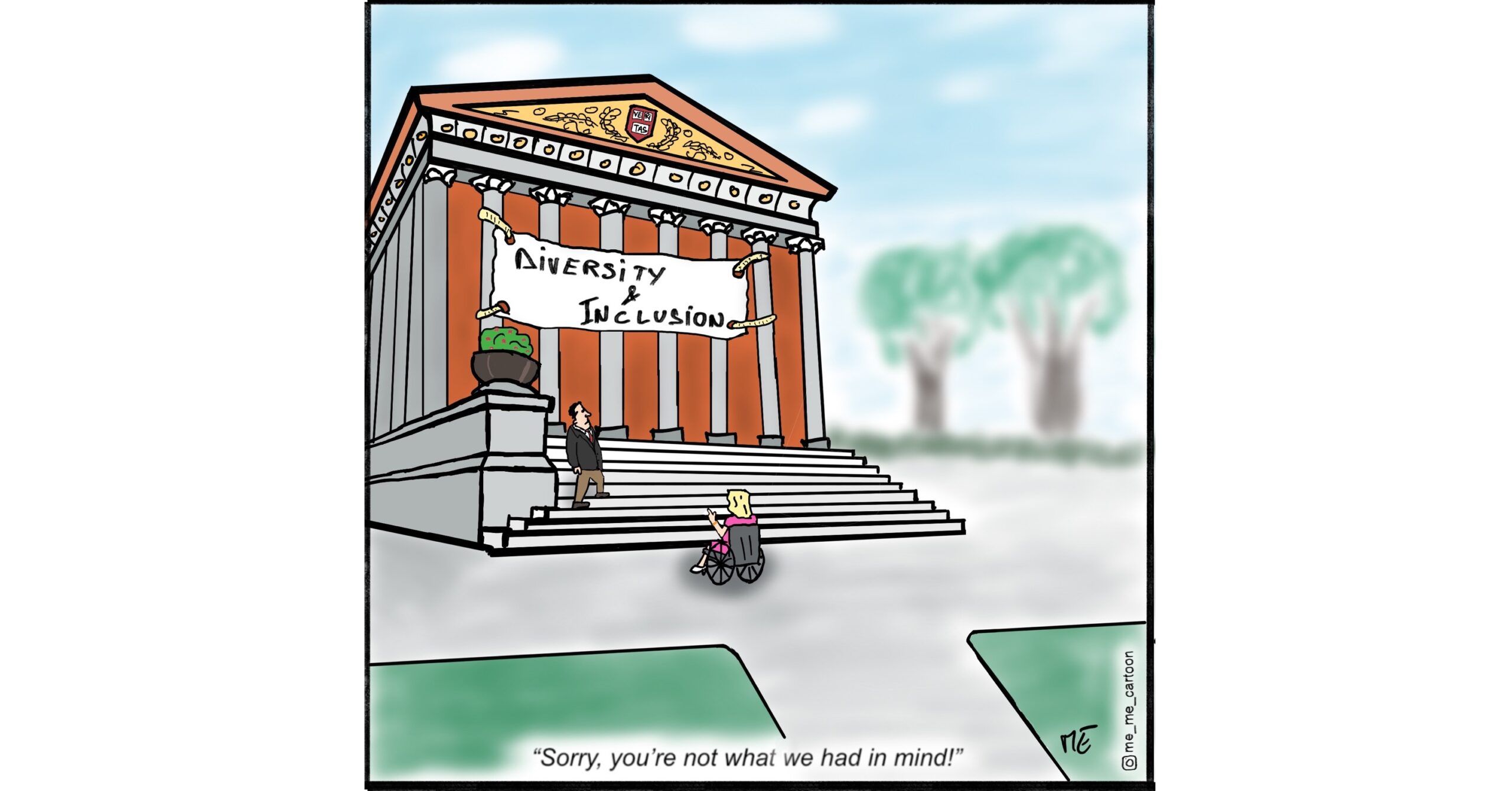Original Cartoon by Laurent Boinot. Laurent is a life-long learner, an innovation consultant, an award-winning EdTech entrepreneur and a fledgling cartoonist. He is a recent graduate from the Mid-Career MPA program at HKS. His purpose is “Expanding Curiosity!” See more of his cartoons here. Instagram @me_me_cartoon
Last week, the Harvard Kennedy School announced that it will add a required course on racism to the MPP core curriculum. The action comes in response to dogged student advocacy and the recent events, which spurred discussions on systemic racism in policing. It’s a step in the right direction. But for HKS to properly prepare its students in the greater fight for social justice, it must ensure its commitment to diversity, including a recognition of the regularly forgotten disability community.
Last summer, I began my year as a Mid-Career MPA student. After years of practicing law and working in disability policy, I was excited to hone my advocacy skills at Harvard. During the summer, our class met for a diversity and inclusion seminar, given by Professor Robert Livingston. Sitting in the front row, in a space made specifically for my wheelchair, I listened with intrigue as he described various ways in which people of color and women are discriminated against due to implicit bias.
With fascination, I listened as he explained why white women and straight-passing black men are perceived negatively when showing dominance or agency simply due to their appearance. I eagerly waited to hear how disability played a part, but it never came. In fact, in the two minutes that I used the bathroom, he single-handedly covered disability with an explanation on the equity of accessible parking.
I wish I could say this experience was unique, but it wasn’t. Not a single class discussed or even mentioned disability, despite covering issues of race, gender and sexuality. Every professor I met, except Dr. Jennifer Lerner who has a disability herself, excused the absence of disability on the nonexistence of data. This is both inaccurate and emblematic of the greater issue.
Police violence, the dominant topic in the news right now, is a prime example of how disability is excluded from the conversation. According to a study by the Ruderman Family Foundation, between 30% and 50% of police killings are of people with a disability. Police violence is just one example though. We also make up 30% of people in jails and prisons and are more than twice as likely to live in poverty. Over 80% of the community is unemployed, and it’s also a community that anyone can join at any time. Indeed, the odds of acquiring a disability increase with age.
Despite these alarming statistics, people rarely include disability when discussing issues of diversity. In fact, despite the fact that one in four adults have a disability, last year, the Harvard University-wide Pulse Survey on diversity and inclusion failed to offer disability as a demographic from which to identify. Yet, they made a thoughtful and important effort to provide several classifications for genderqueer identities, which comprise just 0.06% of the population. Further, there was no mention of this oversight in the executive summary of the results, forcing those of us who hadn’t participated in the survey to discover the glaring omission buried in the long-form report.
As many students of color at HKS have been unfairly burdened with educating their classmates on race, I have had to do the same for disability issues throughout the year. While, in my opinion, the best way for others to truly understand these issues is through peer education, students shouldn’t be required to hold this responsibility. And it’s unreasonable to expect anyway since students with disabilities are under-represented at Harvard University in general. Merely offering a single elective course on disability policy is insufficient.
The absence of disability inclusion in diversity initiatives is both a missed opportunity for the school and a massive disservice to the students. The school is not only failing to educate its students on the matter but struggles to help disabled students succeed post-graduation. Indeed, the Office of Career Services has zero experience assisting students with disabilities, and its counselors couldn’t even suggest disability-related employment resources, like DisabilityIN, when I requested them. Worst of all, the school seems to not care about these failures: Robbin Chapman, the Dean of Diversity & Inclusion, has never once responded to my emails expressing my concern on the subject.
To truly honor the legacy of civil rights in this country, I believe the institution must recognize that “injustice anywhere is a threat to justice everywhere.” All versions of oppression threaten our ability to achieve justice. Thus, as students cry out for justice, the school has an opportunity to demonstrate its commitment to diversity by amending the new core curriculum class to cover all forms of systemic discrimination, including ableism. And it should be taught by various experts on each classification of bias. The arc of the moral universe might bend towards justice, but it doesn’t bend on its own. Advocates for social justice, like those drawn to HKS, must push it there.
